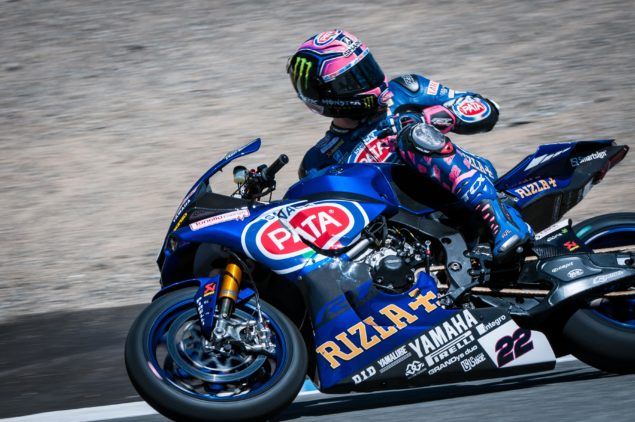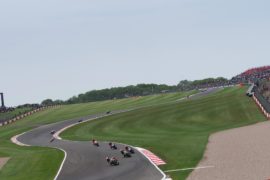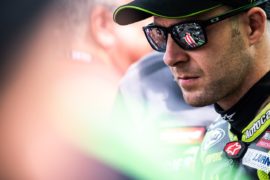The Pata Yamaha team issued the following press release, containing an interview with Alex Lowes. In it, the rider talks about something others are not keen on discussing, using a sports psychologist in search of better results. An interesting read.
Alex Lowes Q&A: Working with a Sports Psychologist
Sports psychologists are becoming more and more common in motorcycle racing, with people curious about the affect they can have. Yamaha-racing.com caught up with Pata Yamaha Official WorldSBK Team’s Alex Lowes to discuss his use of a sports psychologist and the difference it has made.
Pata Yamaha Official WorldSBK Team’s Alex Lowes has had a positive start to the 2017 FIM Superbike World Championship season. The British rider has recorded two podiums so far this season and has added consistency to his undeniable pace to currently lie fifth in the championship standings.
One of the things he attributes this new attitude to has been his work with a sports psychologist.
In modern sport, most professional athletes will use a sports psychologist in some way or another, and with motorcycle racing being a sport that places so much mental demand on a rider, some people find it a shock that more people don’t use them. Lowes answered our questions ahead of the WorldSBK summer break:
What made you start using a sports psychologist?
One of the most important things as a professional athlete is that you want to improve every aspect, whether it’s with the bike, team, or yourself. At the top level, it is about maximising everything to make sure you reach your full potential.
I just wanted to make sure I was getting the most out of myself. In the past I used to try too hard, I’ve never struggled for motivation, but I had to learn how to control my passion and not get annoyed at certain situations.
Everyone is at such a high level, any advantage you can gain, no matter small, can help. When things are going well and you are winning, it’s easy to be calm and in control, but when it is not going well it’s a lot harder. For me, it’s all about learning to control my emotions and maximise my potential.
What kind of work do you focus on?
The biggest thing we focus on is taking a step back. It’s important to give yourself space to work out what’s actually going on. This allows you to focus and stop other factors affecting you, giving you mental space to deal with things and ensure your head is clear when you are on the bike.
We work on writing stuff down, how to deal with any issues that arise and learning the importance of talking about stuff. If you just let stuff build up in your brain, whether at work or at home, you can get a cloudy head and that’s not a good place to be.
If you can be in a position where you have a lot of space, and you have a plan, everything is much nicer and clearer.
How often are you in contact?
I am in contact with him quite a lot, but it is less than it was to start with. For the first 3-4 months I worked very closely with him, but after a time, it’s then down to you. The whole process is about learning to understand yourself.
He is always there if I need him, but I am in control of myself a lot more now. It’s a case of learning the principles and theories, and then it’s down to you to apply them.
What difference has it made to you?
It’s difficult to say in pure performance, because you can’t compare this year’s results to last year, as there are too many variables to take into account, such as improvements with the bike. I am a bit calmer mentally and this means I can be more consistent.
The thing I’ve learnt in general is that it’s never as bad as you think. On the flip side, it’s never as good as you think either, it’s just a case of life goes on. This is especially true in sport and even more so with bike racing with how the calendar and season are.
If you can learn to be happy with yourself, with your job, relationship and life, you are winning anyway. If you win a race or crash out from 10th, the only difference in your head is what you allow it to be. So, the biggest thing I’ve learnt is not to take anything personally.
You have to try and improve things when it’s not going well, and enjoy things when they are going right. Keep it simple. I would never have said 3-4 years ago there is more to life than what happens on a bike, but there is.
If you win the World Championship it’s a huge achievement, but in ten years’ time, in the grand scheme of things, no one will really care.
I want to be World Champion because that is what I want to do, but now as long as I achieve my best, I can be happy. I am a lot happier away from racing too and I am thankful for this as you need to enjoy your life.
Source: Pata Yamaha; Photos: © 2017 Jensen Beeler / Asphalt & Rubber – Creative Commons – Attribution 3.0
This article was originally published on MotoMatters, and is republished here on Asphalt & Rubber with permission by the author.




